Directions (1- 7): Read the following passage carefully and answer the questions given below them. Certain words/phrases have been printed in bold to help you locate them while answering some of the questions.
Last year the idea took hold that Mark Zuckerberg might run for president in 2020 and seek to lead the world’s most powerful country. Today, Facebook’s founder is fighting to show that he is capable of leading the World’s eighth-biggest listed company or that any of its 2.1bn users should trust it. News that Cambridge Analytica (CA), a firm linked to President Donald Trump’s 2016 campaign, got data on 50m Facebook users in dubious, possibly illegal, ways has lit a firestorm. Mr. Zuckerberg took five days to reply and, when he did, he conceded that Facebook had let its users down in the past but seemed not to have grasped that its business faces a wider crisis of confidence. After months of talk about propaganda and fake news, politicians in Europe and, increasingly, America see Facebook as out of control and in denial. Congress wants him to testify. Expect a roasting.
Since the news, spooked investors have wiped 9% off Facebook’s shares. Consumers are belatedly waking up to the dangers of handing over data to tech giants that are run like black boxes. Already, according to the Pew Research Centre, a think tank, a majority of Americans say they distrust social-media firms. Mr. Zuckerberg and his industry need to change, fast.
The addiction game
Facebook’s business relies on three elements: keeping users glued to their screens, collecting data about their behavior and convincing advertisers to pay billions of dollars to reach them with targeted ads. The firm has an incentive to promote material that grabs attention and to sell ads to anyone. Its culture melds a ruthless pursuit of profit with a Panglossian and narcissistic belief in its own virtue. Mr. Zuckerberg controls the firm’s voting rights. Clearly, he gets too little criticism.
In the latest fiasco, it emerged that in 2013 an academic in Britain built a questionnaire app for Facebook users, which 270,000 people answered. They in turn had 50m Facebook friends. Data on all these people then ended up with CA. Facebook says that it could not happen again and that the academic and CA broke its rules; both deny doing anything wrong. Regulators in Europe and America are investigating. Facebook knew of the problem in 2015, but it did not alert individual users. Although nobody knows how much CA benefited Mr. Trump’s campaign, the fuss has been amplified by the left’s disbelief that he could have won the election fairly. But that does not give Facebook a defense. The episode fits an established pattern of sloppiness towards privacy, tolerance of inaccuracy and reluctance to admit mistakes. In early 2017 Mr. Zuckerberg dismissed the idea that fake news had influenced the election as “pretty crazy”. In September Facebook said Kremlin-linked firms had spent a mere $100,000 to buy 3,000 adverts on its platform, failing at first to mention that 150m users had seen free posts by Russian operatives. It has also repeatedly misled advertisers about its user statistics.
Q1. What is Cambridge Analytica(CA)?
(a) A virus that multiplies the files and folders in the system.
(b) A program that manipulates the data transferred on the various networks.
(c) A firm linked to the President Donald Trump that handles all the presidential affairs of the State.
(d) A firm linked to the President Donald Trump’s 2016 campaign got data on 50m users in dubious and illegal manner.
(e) Both (A)&(B)
Q2. Which of the following given statements is correct in the context with the passage?
(a) Mark Zuckerberg will be the president in 2020 and seek to lead the world’s most powerful country US.
(b) Facebook’s founder showed that he is capable of leading the world’s 8th largest company.
(c) After months of talks about propaganda, America sees Facebook as out of control and in denial.
(d) Investors have invested 9% more in the company after the campaign Cambridge Analytica.
(e) Mark Zuckerberg took 5 days to reply and when he did, he proved that Facebook had never let down the confidence of its users.
Q3. What is/are the element(s) on which the business of Facebook relies?
(a) keeping users glued to their screens
(b) collecting data about their users’ behaviour
(c) convincing advertisers to pay billions of dollars to reach them with targeted ads
(d) All of the above
(e) None of the above
Q4. What are the incentives of the firm Facebook?
(a) To promote sites that can attract various people to connect through it
(b) To promote stuff that attracts and grabs attention
(c) To sell ads to anyone through its stuff advertised
(d) To control firm’s voting rights
(e) Both (B)&(C)
Q5. How academic and Cambridge Analytica(CA) broke its rules?
(a) By emerging as the President’s campaign of 2016
(b) By connecting with Facebook and selling ads to everyone
(c) By controlling voting rights of Mark Zuckerberg’s company
(d) By collecting data of 270,000 people via questionnaire app which in turn ended up the data of 50m users with CA
(e) By not apologizing the 50m users who have accessed their data to Britains’s academic and Cambridge Analytica
Q6. What conclusion you can draw from the whole episode?
(a) that none of the firms likes to admit its mistake
(b) that the whole scenario admits sloppiness towards privacy, tolerance of inaccuracy and reluctance to admit mistakes
(c) that the
(d) fake news had influenced the election as “pretty crazy”
(e) None of the above
Q7. Which of the following statements is incorrect in context with the passage?
(a) Facebook has repeatedly misled advertisers about its user statistics.
(b) Facebook says that it could not happen again and that the academic and CA broke its rules
(c) The episode fits an established pattern of sloppiness towards privacy, tolerance of inaccuracy and reluctance to admit mistakes
(d) Facebook knew of the problem in 2015, and it did alert its individual users
(e) It emerged that in 2013 an academic in Britain built a questionnaire app for Facebook users
Directions (8-15): In the questions given below a sentence is given with two blanks in each. Corresponding to each question two columns are given with three words in each column. Which combination of words from the two columns will perfectly fit into the blanks to make the sentence contextually correct and meaningful.
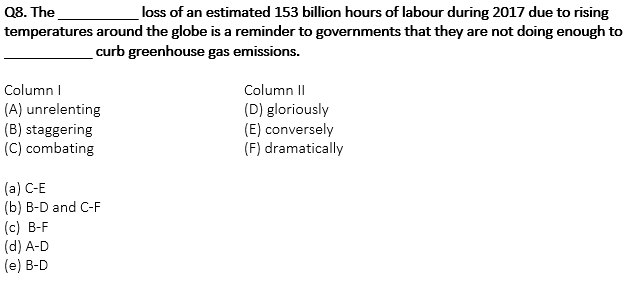
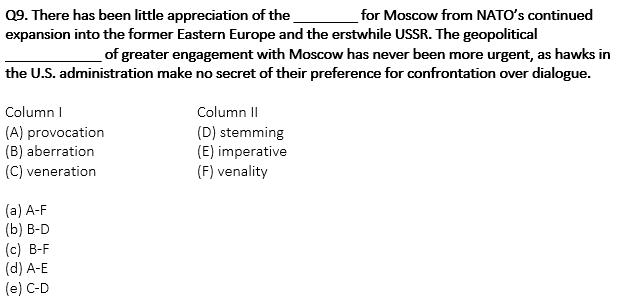
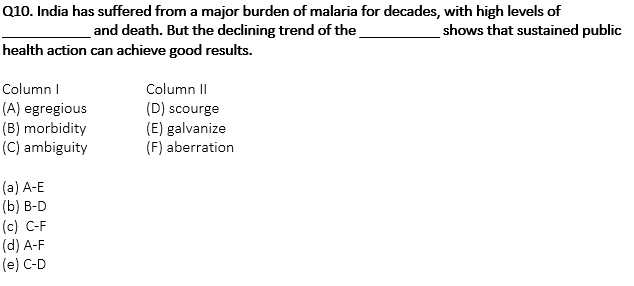
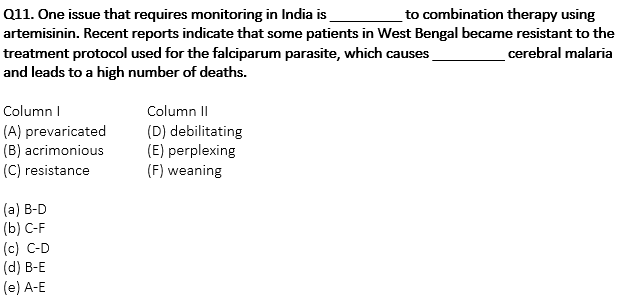
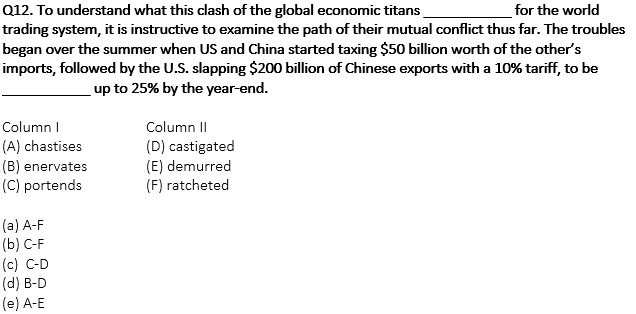
Directions (13-15): In the following questions a sentence is given, some words are given in bold which may have grammatical or spelling error or they may be contextually incorrect. Two columns (I) and (II) are given, column (I) consists of bold words of the sentence and column (II) consists of the appropriate replacement for the bold words. Match the correct replacements. If the sentence is correct mark no error as your answer.
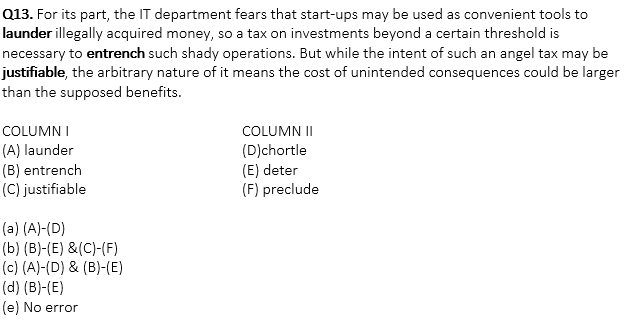
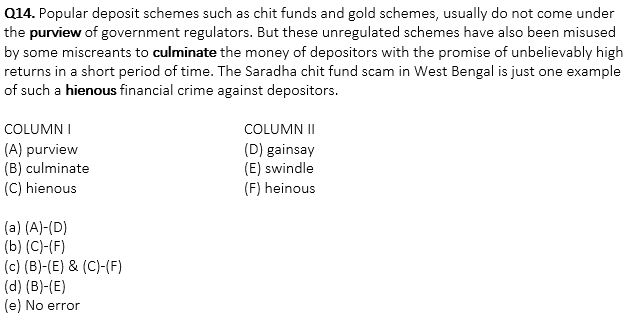
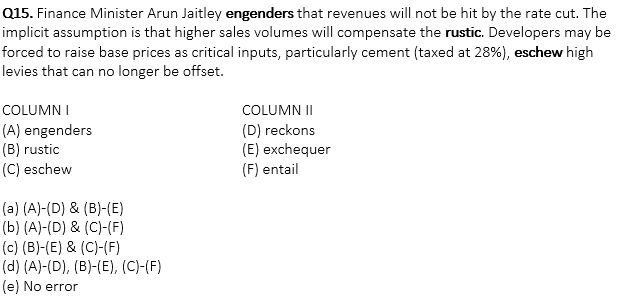
Solutions
S1. Ans.(d)
Sol. refer paragraph 1(5th line)
S2. Ans.(c)
Sol. refer paragraph 1(last three lines)
S3. Ans.(d)
Sol. refer paragraph 3(1st three lines)
S4. Ans.(e)
Sol. refer paragraph 3(3rd line)
S5. Ans.(d)
Sol. refer paragraph 4(1st three lines)
S6. Ans.(b)
Sol. ‘The episode fits an established pattern of sloppiness towards privacy, tolerance of inaccuracy and reluctance to admit mistakes’……refer paragraph 4(8th line)
S7. Ans.(d)
Sol. ‘Facebook knew of the problem in 2015, but it did not alert individual users’…… refer paragraph 4(5th line)
S8. Ans. (c)
Sol. Here, the given sentence has discussed the consequences of the failure of government’s part for controlling the rising global temperatures. Here, in the first blank, “staggering” which means “deeply shocking; astonishing” and “dramatically” in second blank which means “by a strikingly large amount or to a strikingly large extent; greatly”, perfectly fits in to make a contextually meaningful and grammatically correct statement.
Unrelenting: not yielding in strength, severity, or determination
Combating: take action to reduce or prevent (something bad or undesirable)
Conversely: introducing a statement or idea which reverses one that has just been made or referred to.
S9. Ans. (d)
Sol. The given statement discusses the limited reaction on the part of Moscow towards the continued expansion of NATO in Eastern Europe and USSR. Here, in the first blank, “provocation” which means “action or speech that makes someone angry, especially deliberately” and in second blank “imperative” which means “of vital importance; crucial” fits perfectly in the given blanks to make a contextually meaningful and grammatically correct statement.
Aberration: a departure from what is normal, usual, or expected, typically an unwelcome one
Veneration: great respect; reverence
Stemming: originate in or be caused by
Venality: quality of being open to bribery or overly motivated by money
S10. Ans. (b)
Sol. The satement has mentioned the high number of malaria cases in India which have led to high death rates. It further states the improved condition due to sustained public health actions. Here, in the first blank, “morbidity” which means “the condition of being diseased” and in the second blank “scourge” which means “a person or thing that causes great trouble or suffering”, fits perfectly to form a contextually meaningful and grammatically correct statement.
Egregious: outstandingly bad; shocking
Ambiguity: the quality of being open to more than one interpretation; inexactness
Galvanize: shock or excite (someone) into taking action
Aberration: a departure from what is normal, usual, or expected, typically an unwelcome one
S11. Ans. (c)
Sol. Here, the given statement discusses the need to monitor a therapy which has been adopted to a severe disease, cerebral malaria. Most patients, affected by the disease have been resistant to treatment. Here, in the first blank, “resistance” which means “the refusal to accept or comply with something” and in second blank, “debilitating” which means “(of a disease or condition) making someone very weak and infirm” perfectly fits to make the statement grammatically and contextually meaningful. Hence, option (c) is the most suitable answer choice.
Prevaricated: speak or act in an evasive way.
Acrimonious: (typically of speech or discussion) angry and bitter
Perplexing: completely baffling; very puzzling
Weaning: be strongly influenced by (something), especially from an early age
S12. Ans. (b)
Sol. The paragraph given here discusses the US- China trade war where, “portends” which means “be a sign or warning that (something, especially something momentous or calamitous) is likely to happen”, fits perfectly in the first blank and “ratcheted” which means “cause something to rise (or fall) as a step in what is perceived as an irreversible process”, fits perfectly in the second blank. Hence, option (b) is the most suitable answer choice.
Chastises: rebuke or reprimand severely
Enervates: make (someone) feel drained of energy or vitality
Castigated: reprimand (someone) severely.
Demurred: raise objections or show reluctance
S13. Ans. (d)
Sol. Here, the given paragraph mentions how start-ups may use the tax exemptions available for them as a tool of money laundering. Here, “entrench” makes the statement grammatically incorrect which will thus be replaced with “deter”. Hence, option (d) is the most suitable answer choice.
Launder: conceal the origins of (money obtained illegally), typically by transfers involving foreign banks or legitimate businesses.
Chortle: laugh in a noisy, gleeful way.
Entrench: establish (an attitude, habit, or belief) so firmly that change is very difficult or unlikely
Deter: discourage (someone) from doing something by instilling doubt or fear of the consequences
Justifiable: able to be shown to be right or reasonable; defensible
Preclude: prevent from happening; make impossible.
S14. Ans. (c)
Sol. The paragraph given above mentions the gold schemes and cit funds which are not under the regulation of government regulators and therefore have been used by miscreants for fraudulent activies. Here, “culminate” will be replaced with “swindle”, which will make the statement contextually correct. Also, “hienous” will be replaced with “heinous” as the given spelling is incorrect. Hence, option (c) is the most suitable answer choice.
Purview: the scope of the influence or concerns of something
Gainsay: deny or contradict
Culminate: reach a climax or point of highest development
Swindle: use deception to deprive (someone) of money or possessions
S15. Ans. (d)
Sol. The paragraph given above mentions the statement by FM Arun Jaitley who has assured that there won’t be revenue hits sue to the rate cut. He has further stated that the higher sales volumes would compensate the national income growth which may force the developers to raise base prices as an inevitable consequence of rate cuts. Here, all the three highlighted words have been incorrectly placed and will therefore require improvement. Hence, option (d) is the most suitable answer choice.
Engender: cause or give rise to
Reckon: be of the opinion
Rustic: made in a plain and simple fashion
Exchequer: a royal or national treasury.
Eschew: deliberately avoid using; abstain from
Entail: involve (something) as a necessary or inevitable part or consequence
Click Here to Register for Bank Exams 2021 Preparation Material


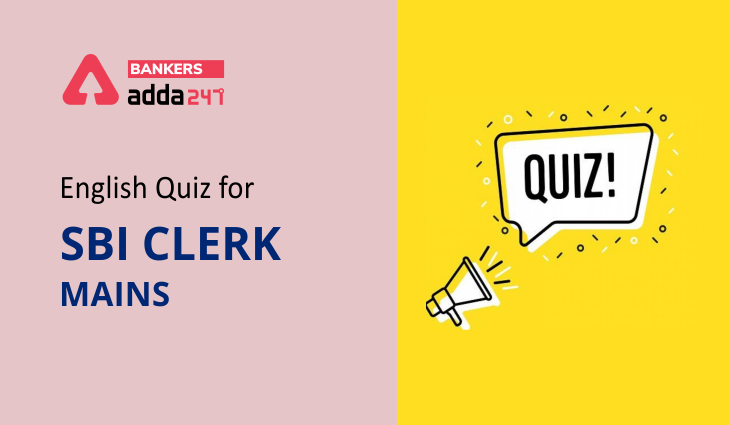


 English Language Quiz For Bank Foundatio...
English Language Quiz For Bank Foundatio...
 English Language Quiz For SBI Clerk Prel...
English Language Quiz For SBI Clerk Prel...
 English Language Quiz For SBI Clerk Prel...
English Language Quiz For SBI Clerk Prel...







